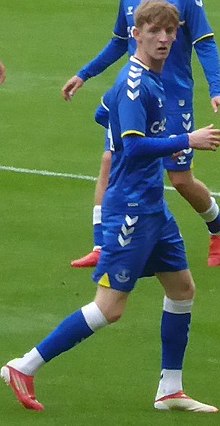Article body analysed
EPL On the right? Cutting in from the left? Deputising at centre-forward? How Newcastle United use Anthony Gordon against Liverpool tonight at St James’ Park will have been occupying visiting head coach Arne Slot’s thoughts. The only certainty is the England international will line up for the fixture in a black and white shirt rather than a red one. Advertisement Considering that, five months ago, the framework of a £75million ($95. 3m) transfer between the clubs had been discussed — Joe Gomez, the defender, would have moved the other way for £45m — that fact deserves emphasis. The sale of Gordon was only briefly, if seriously, considered because Newcastle became so desperate to comply with the Premier League’s profit and sustainability rules (PSR) by June 30. With Liverpool long-term admirers and Gordon having grown up a ‘Red’, despite graduating from Merseyside neighbours Everton’s academy, it was a fleeting consideration, described by insiders as the “nuclear option”. As it was, Newcastle felt Liverpool were not in a position to conclude the transfer swiftly enough and, to head coach Eddie Howe’s great relief, the June deadline passed without Gordon leaving. Then, despite some first-team sources fearing the player’s head had been turned by his boyhood club, Newcastle confirmed in October that Gordon had agreed a new “long-term contract”, rewarding the 23-year-old for his 11 goals and 10 assists in the 2023-24 Premier League. This season has not been so productive: Gordon has only two goals and one assist in 12 top-flight appearances; his body language has been negative at times when asked to play on the right, and overall his form has been inconsistent. As a result, the wisdom of elevating Gordon to among the club’s top earners is being queried. However, recent displays should not unduly distort the soundness of Newcastle’s decision-making or the foresight their recruitment department showed when pushing to sign the winger almost two years ago. Gordon boasts a rare set of characteristics: he is durable, pacy, direct, hard-working, versatile and has end-product. Most wingers have some of those traits, but few possess them all. That is why, despite his form, Gordon is still arguably Newcastle’s most-prized asset. Now he needs to prove it again regularly. He must repay the faith Newcastle have shown in him. Rewind to January 2023 and few onlookers were convinced that Gordon, for an initial £40million, should be the solitary target in that window for a Newcastle side then chasing Champions League qualification. But Howe was fixated on Gordon, convinced the 21-year-old had the raw attributes to be honed into a top-class attacker. As the head coach revealed last year, it was Andy Howe, the club’s assistant head of recruitment, who was “absolutely prominent” in pushing for the Everton man. Advertisement Andy followed Eddie, his uncle, to Tyneside from fellow Premier League side Bournemouth, where he was head of first-team UK player scouting. In that role, Andy Howe had tracked Gordon’s progress through Everton and England youth levels. During now Newcastle assistant manager Jason Tindall’s season in charge of Bournemouth following Eddie Howe’s decision to step down post-relegation in summer 2020, the then Championship side made an unsuccessful loan offer to Everton for a 19-year-old Gordon in the January, but Andy Howe continued to track him. When it came to Newcastle eventually signing Gordon, that long-term interest proved important. During the summer of 2022, Newcastle had made their desire to buy him clear to Everton. Tottenham were also interested and Chelsea made a bid — Gordon admitted last month that he “was quite close” to moving to Stamford Bridge and was “desperate to go”. But, with Gordon having scored only three goals and provided no assists in 16 games for a struggling Everton side, and having become the focus of much supporter discontent, Newcastle were the only club to make a firm attempt to acquire him in the mid-season window. Although Everton supporters questioned Gordon’s attitude during his final months at Goodison Park, Newcastle’s recruitment team were confident — after extensive due diligence — that they had an accurate impression of his personality. Gordon’s insatiable desire to improve set him apart from others and his single-mindedness impressed Andy Howe from the start. Not everyone at Newcastle felt that an initial £40million, to be paid in a lump sum, and a potential £5m more in add-ons represented a sensible deal, given the club’s PSR constraints. But the Howes both pushed for the signing, determining that Gordon’s aggressive approach made him ideal for Newcastle’s front-footed, intense style. There were few, if any, other wingers around with his potential to excel on both flanks. There was also a belief that, having seen him deliver end product throughout youth levels, the winger’s attacking numbers would improve with diligent work on the training field. It was a calculated gamble, based on how Newcastle play and how they would use Gordon. Rather than carrying possession from deep largely by himself, as he did at Everton, Gordon’s ability in transition could be utilised higher upfield and he could be delivered into goal-scoring, crossing and one-v-one situations more frequently, with more team-mates around him to help. Newcastle also knew that the 21-year-old still needed to fill out, to become more physically robust, meaning he could then materially affect matches for longer. Advertisement There was also that scarcity of wingers who could play effectively off either flank, which Gordon can do, at least theoretically, if he is focused and motivated to do so. “Very much that was the profile of player that we were looking for, ” Howe said of Gordon last month. “They’re not easy to find, players that are comfortable off both sides. ” In hindsight, Newcastle consider the £40million a relative bargain. Last season, Gordon’s game-defining displays more than justified his price, with his value almost doubling. He was one of only five players to reach double figures for both goals and assists in the Premier League — the others were Ollie Watkins, Mohamed Salah, Cole Palmer and Son Heung-min. Gordon provided a goal contribution at a rate of 0. 65 per 90 minutes — 0. 34 goals, 0. 31 assists — and they were often telling interventions. He also won six top-flight penalties. GO DEEPER Should we credit winning penalties as a measure of creativity? Showing durability and versatility during Newcastle’s injury-affected campaign, Gordon played 84 per cent (3, 865 minutes) of the total minutes across all competitions and featured in 48 of their 51 games. He excelled from the left but was also used on the right, as a second striker, as a No 8, and even at centre-forward. Gordon’s underlying stats also revealed his improvement and how the transition to Newcastle’s approach — after some difficulties during a six-month bedding-in period — allowed the winger to thrive. For shot-creating actions — which fbref. com defines as offensive actions leading to shots — Gordon’s numbers per 90 more than doubled from 1. 9 at Everton in the first half of 2022-23 to 4. 5 for Newcastle in 2023-24. Having failed to lay on an assist for his team-mates at Goodison Park in those 16 appearances two seasons ago, last term Gordon was registering 0. 9 goal-creating actions per 90. What’s more, while his touches per 90 increased from 38. 0 to 44. 4, the percentage of them that came in his own defensive third dropped (from 18. 8 per cent to 11. 1) and the percentage in the attacking third rose (from 47. 1 per cent to 51. 4). Crucially, his progressive carries — those which move the ball at least 10 yards forwards — increased, as did the total progressive carries distance and the number of progressive passes he received.
However, as with Newcastle generally, there has been an alarming regression over the first four months of the current campaign. Season on season, not only are Gordon’s headline figures down per 90 for goals (0. 34 in 2023-24 to 0. 18 in 2024-25) and assists (0. 31 to 0. 09), but so are almost all of his attacking returns. Advertisement His non-penalty expected goals (x G) number has decreased (from 0. 29 to 0. 22), which means his shots are of a lower quality. He is also providing poorer chances for his team-mates, given his expected assists (x A) figure is also lower (0. 25 to 0. 20). Gordon is shooting less frequently (2. 5 to 1. 5) and also hitting the target less often (0. 9 to 0. 6). Although Gordon is receiving a slightly increased number of progressive passes (7. 2 to 7. 6), his progressive carries (4. 3 to 3. 5) and progressive passes (3. 2 to 2. 4) are down. His shot-creating actions (4. 6 to 3. 9) and goal-creating actions (0. 9 to 0. 2) have fallen, while his average progressive-carries distance has dropped (114. 3 yards to 100. 5).
There is a stark contrast between his home and away performances, too. Since the start of last season, only 25 per cent of his goal involvements (six from 24) have come on the road. He scores fewer goals away from St James’ Park (three to 10) and lays on fewer assists (three to eight) — indeed, all of his attacking metrics decrease, many of them substantially, at other clubs’ grounds. While it is common for whole teams and individual players to see a drop-off on their travels, Gordon’s apparent reliance on home comforts is becoming a worrying trend.
Undoubtedly, these diminishing returns season on season require mitigation. The summer was “unsettling” for him, as Howe admitted, while there is a general questioning of Newcastle’s ambition and whether they can match their elite players’ growth in the short-to-medium term, given the constraints of PSR. Gordon’s lack of action at the European Championship, playing only once as an 89th-minute substitute across England’s seven matches in getting to the mid-July final, also meant he returned to Newcastle for a shortened pre-season and with his confidence dented. Advertisement Wor Flags dedicated a pre-match display to Gordon ahead of the 1-1 draw with Manchester City in September and that conjured one of his most intense, encouraging performances of the season. Flashes of quality have been all-too-fleeting since. Although he is more effective from the left, Gordon’s apparent frustration when asked to play on the right is becoming too evident in his body language. His improved contract was warranted but it is time he started justifying it again. A match-defining performance against title favourites Liverpool tonight would be beyond welcome — and could breathe fresh momentum into Newcastle’s stuttering campaign. GO DEEPER England's Anthony Gordon is Newcastle United's player of the season and a £40million bargain (Top photo: Richard Pelham via Getty Images) Get all-access to exclusive stories. Subscribe to The Athletic for in-depth coverage of your favorite players, teams, leagues and clubs. Try a week on us. Chris Waugh is a staff writer for The Athletic, covering North East football and most particularly Newcastle United. Before joining The Athletic he worked for Mail Online, and then reported on NUFC for The Chronicle, The Journal and The Sunday Sun. He has covered NUFC home and away since 2015. Follow Chris on Twitter @Chris DHWaugh


